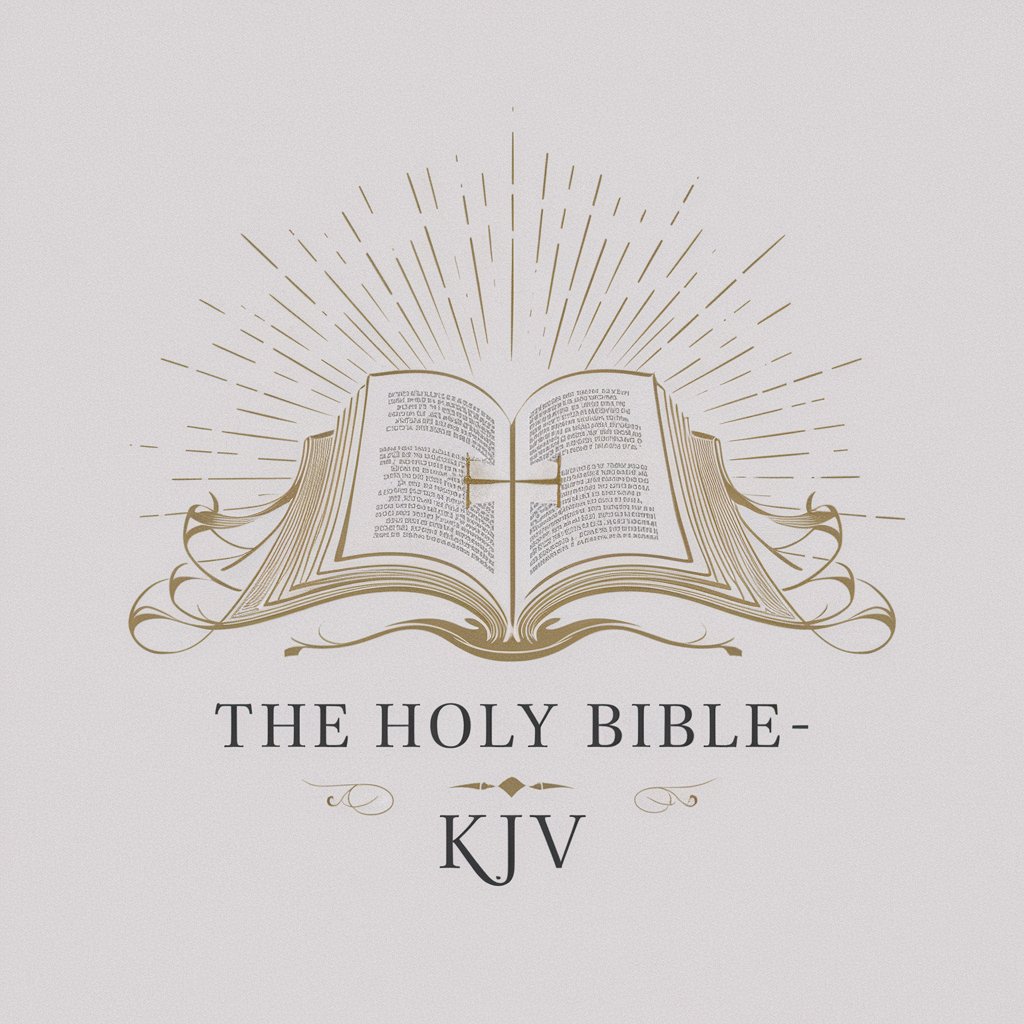The Holy Bible - KJV - Access to Timeless Wisdom

Welcome to divine wisdom.
Explore the Literary Grandeur of the KJV Bible
In the beginning...
Let there be...
And God said...
Blessed are...
Get Embed Code
Introduction to The Holy Bible - KJV
The Holy Bible - King James Version (KJV) is a comprehensive religious text foundational to Christianity, known for its deep historical, spiritual, and moral significance. It encompasses the Old Testament, detailing the history, prophecies, and laws of the Jewish people, and the New Testament, which focuses on the life, teachings, death, and resurrection of Jesus Christ. Designed for a wide array of applications, from scholarly study to personal reflection and spiritual growth, its functions are as diverse as its audience. It serves as a source of inspiration, a guide for ethical living, a framework for understanding historical contexts, and a basis for theological study. For example, the stories of creation, the exodus of the Israelites, the wisdom literature, the prophecy of Christ's coming, and the teachings of Jesus offer insights into human nature, divine principles, and the path to salvation. Powered by ChatGPT-4o。

Main Functions of The Holy Bible - KJV
Spiritual Guidance and Inspiration
Example
Individuals seeking moral direction or comfort often turn to passages like Psalm 23 for assurance of God's protection and provision, or to the Sermon on the Mount (Matthew 5-7) for teachings on ethical living and spiritual maturity.
Scenario
In times of personal challenge or decision-making, a reader might reflect on the principles found within the Beatitudes or Paul's letters to encourage kindness, perseverance, and love.
Theological Study and Education
Example
Scholars and theologians delve into the historical and cultural contexts of biblical narratives, prophecies, and parables to extract deeper theological meanings, such as the significance of covenant in the books of Genesis and Exodus or the interpretation of apocalyptic literature in Revelation.
Scenario
In an academic or church setting, a study group might systematically explore the Book of Romans to understand the foundations of Christian doctrine, including justification by faith, sanctification, and the role of the law.
Liturgical Use and Worship
Example
Many Christian denominations incorporate scripture readings into their worship services, drawing from a lectionary that cycles through key biblical texts to recount the story of God's work in the world.
Scenario
During Easter, passages recounting the crucifixion and resurrection of Jesus (such as Luke 24) are read to commemorate the central event of Christian faith, reflecting on its implications for hope and redemption.
Moral and Ethical Reflection
Example
Individuals and communities refer to biblical commandments, such as the Ten Commandments in Exodus 20, and Jesus' teachings on love and forgiveness, to form the basis of their ethical decisions and interactions.
Scenario
A community facing social injustice may draw on the prophetic books, like Amos or Isaiah, to advocate for righteousness, justice, and care for the marginalized.
Ideal Users of The Holy Bible - KJV Services
Faith Seekers and Believers
Individuals exploring or deepening their faith find the Bible essential for understanding the Christian worldview, experiencing spiritual growth, and fostering a personal relationship with God.
Scholars and Students
Academics and students in theology, religious studies, history, and literature use the Bible as a primary source for academic research, understanding historical contexts, and exploring literary themes.
Church Leaders and Educators
Pastors, ministers, and religious educators rely on the Bible for sermon preparation, teaching material, and guiding congregations in worship, doctrine, and moral living.
General Readers Seeking Wisdom
Individuals looking for wisdom, ethical guidance, or answers to life's big questions turn to the Bible for stories, proverbs, and teachings that offer timeless insights into how to live well.

Using The Holy Bible - KJV
Start your journey
To begin exploring The Holy Bible - KJV, initiate your experience at yeschat.ai, where you can enjoy a complimentary trial with no obligation to sign up or subscribe.
Choose your focus
Identify your purpose for engaging with the text, whether it's for spiritual growth, academic research, literary analysis, or personal enlightenment.
Engage with the content
Read, contemplate, and meditate on the passages. Utilize tools like cross-references and commentaries for a deeper understanding.
Reflect and apply
Consider how the teachings and stories reflect in your own life or in the broader human experience. Apply these insights to personal growth or academic exploration.
Share and discuss
Engage with others in discussion forums or study groups to share interpretations and gain diverse perspectives, enriching your understanding.
Try other advanced and practical GPTs
Companion Comforter
Empowering emotional well-being with AI.

Dieter Rams AI
Crafting simplicity with AI

Meme Generator
Craft Memes with AI Ease

Planet Probe
Deciphering Green Claims with AI

Outline Formatter
Streamlining Complexity into Clarity

Reply
Streamline your communication with AI.

Verse Comforter
Finding Solace in Scripture with AI

Danny Dietitian
Tailored Nutrition, Powered by AI

Dietitian GPT
Power Your Diet with AI

Personal Dietitian
Eat Smart, Live Well with AI

Code Grapher GPT
Turn data into visuals with AI

Mona
Illuminate Your Fate with AI Astrology

Q&A about The Holy Bible - KJV
What makes The Holy Bible - KJV distinct from other versions?
The King James Version (KJV) is renowned for its majestic language and literary beauty, crafted by scholars in the early 17th century under King James I of England. Its poetic style and traditional phrasing have left a significant impact on English-speaking cultures and literature.
How can The Holy Bible - KJV aid in academic research?
The KJV's historical and cultural significance makes it a valuable resource for literary, theological, and historical studies. Its influence on English literature, language, and various academic disciplines offers a rich field for exploration and analysis.
Is The Holy Bible - KJV suitable for personal spiritual growth?
Absolutely. Many find the traditional language of the KJV to be deeply moving and conducive to reflection. Its passages serve as a source for meditation, prayer, and personal growth, guiding individuals in their spiritual journey.
How does one navigate the archaic language in The Holy Bible - KJV?
Familiarizing oneself with early modern English and using supplementary materials like dictionaries or annotations can help. Regular reading and engagement with study groups or literature on the KJV also enhance comprehension over time.
What resources complement a study of The Holy Bible - KJV?
Commentaries, concordances, and historical texts enrich one's understanding. Online platforms and study groups provide interactive ways to discuss interpretations and insights, offering a more comprehensive grasp of the text.
